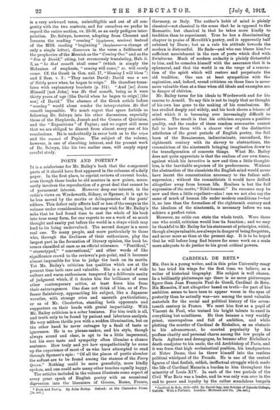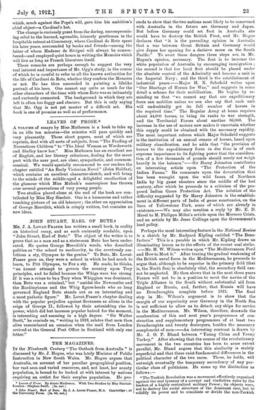CARDINAL DE RETZ.*
Mn. 0043i is a young writer, and in this prize University essay he has tried his wings for the first time, we believe, as a writer of historical biography. His subject is well chosen. In a brilliantly picturesque age there is no more picturesque figure than Jean Francois Paul de Gondi, Cardinal de Retz. His Memoirs, if not altogether based on truth—for part of his ambition seems to have been to appear worse in the eyes of posterity than he actually was—are among the most valuable materials for the social and political history of the seven- teenth century in France. We meet him first as a pupil of Vincent de Paul, who trained his bright talents to excel in everything but saintliness. He then became a very worldly priest, unscrupulous and full of ambition, and while plotting the murder of Cardinal de Richelieu, as an obstacle to his advancement, he courted popularity by his profuse charity and personal charm among the low people of Paris. Agitator and demagogue, he became after Richelieu's death coadjutor to his uncle, the old Archbishop of Paris, and it was from that high ecclesiastical position, his headquarters at Notre Dame, that he threw himself into the restless political whirlpool of the Fronde. He is one of the central figures of that foolish, selfish, ineffectual struggle which made the life of Cardinal Mazarin a burden to him throughout the minority of Louis XIV. In each of the two periods of the Civil War Retz was a leader, and he was only won over in the end to peace and loyalty by the rather scandalous bargain • Cardinal de Bete, 1613-1679. By David Ogg. late Scholar Of Lincoln Colleges Oxford. With a Portrait. London: Methuen and 00. Ds. net.]
which, much against the Pope's will, gave him his ambition's chief object—a Cardinal's hat.
The change is curiously great from the daring, uncompromis- ing rebel to the learned, agreeable, leisurely gentleman in the hospitable retreat at Commercy, where Cardinal de Retz spent his later years, surrounded by books and friends—among the latter of whom Madame de Sevigne will always be remem- bered—and employed quiet hours in writing the Memoirs which will live as long as French literature itself.
These remarks are perhaps enough to suggest the very real interest and importance of Mr. Ogg's study, in the course of which he is careful to refer to all the known authorities for the life of Cardinal de Retz, whether they confirm the Memoirs or not. He has thus succeeded in painting a lifelike portrait of his hero. One cannot say quite as much for the other characters of the time with whom Retz was so intimately and curiously connected. The background in which they are left is often too foggy and obscure. But this is only saying that Mr. Ogg is not yet master of a difficult art. His book is one of promise as well as of performance.



















































 Previous page
Previous page